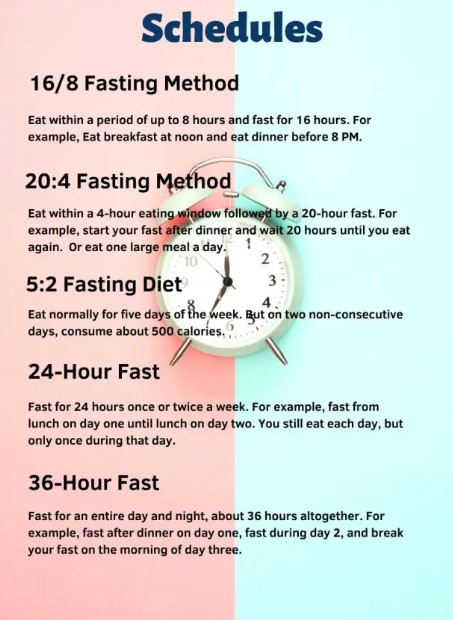
- 1226
- 1
Intermittent fasting- The Secret to Boosting Health and Weight Loss
Are you tired of trying every fad diet out there and still not seeing the results you want? Have you considered intermittent fasting?
Intermittent fasting is a diet strategy that involves alternating periods of fasting and eating. This method has become increasingly popular in recent years as more and more people discover its benefits. But is it just another trend, or could it be the secret to boosting your health and weight loss goals?
What is intermittent fasting?

While many diets concentrate on what to eat, intermittent fasting only considers when to eat.
During Intermittent fasting, you don’t eat for a period of time each day or week or you only eat during a specific time. According to research, eating only one meal a few days a week or fasting for a specific number of hours each day may be healthy habits.
Different approaches to intermittent fasting include:

- Periodic fasting: A period of fasting lasting from 2 to as many as 21 or more days.
- Time-restricted feeding (TRF): This is an eating pattern in which food intake is restricted to a time window of 8 h or less every day.
- Alternate-day fasting: You can follow a regular diet one day and then either go without eating at all or have one tiny meal the following day. Tiny meals refer to less than 500 calories.
- 5:2 fasting: You can eat a normal diet five days a week and fast two days a week.
- Daily time-restricted fasting: Here you can eat normally but only within an 8-hour window each day as you can skip breakfast but eat lunch around noon and dinner by 8 p.m.
One of the most common is the 16/8 method. This involves fasting for 16 hours and then eating within an 8-hour window. For example, you might eat your last meal at 8 pm and then fast until noon the next day, when you would eat your first meal.

One of the main benefits of intermittent fasting is weight loss. When you fast, your body is forced to burn fat for energy instead of relying on the calories you consume. This can help you lose weight, especially if you pair it with a healthy diet and regular exercise.
Intermittent fasting has also been shown to improve insulin sensitivity, which can help prevent type 2 diabetes. It may also help lower cholesterol levels and reduce inflammation in the body.

But perhaps the most surprising benefit of intermittent fasting is its impact on brain function. Studies have shown that fasting can improve cognitive function, memory, and even help prevent age-related cognitive decline.
Are there any side effects of intermittent fasting?
The answer is yes, Followings are some of the common side effects that occur during intermittent fasting.

- Hunger is one of the most common side effects of intermittent fasting, but these hunger symptoms last only during the first few days of the regimens, so the symptoms may resolve as your body adapts to regular fasting periods
- Low blood sugar related to intermittent fasting can cause you to feel tired and weak but intermittent fasting can actually reduce fatigue, especially as your body becomes adapted to regular fasting periods
- Insomnia or sleep disturbances are among the most common side effects of intermittent fasting
- Headaches are also a common side effect of intermittent fasting occurs during the first few days of a fasting protocol, however, fasting headaches” are usually located in the frontal region of the brain and that the pain is typically mild or moderate in intensity. You can resolve this problem by controlling your blood sugar level and withdrawing caffeine from your diet during intermittent fasting.

- Intermittent fasting may cause digestive problems including constipation, diarrhoea, nausea, and bloating. Digestion-related issues can be prevented by choosing nutrient-dense foods rich in fiber which may also help prevent constipation.
- Lack of salivary flow and the rise of acetone in the breath may cause bad breath in some people during intermittent fasting.
Of course, intermittent fasting isn’t for everyone. It’s important to talk to your doctor before starting any new diet or exercise program, especially if you have a history of medical conditions. It’s also important to listen to your body and stop fasting if you experience any negative side effects.
Contact For Nutrition Consultation – +918069841500
In conclusion, intermittent fasting can be a powerful tool for improving your health and achieving your weight loss goals. By giving your body a break from constant eating, you may be able to see some amazing benefits. So why not give it a try and see what intermittent fasting can do for you?
Comment
Check Your EGFR
***We Promise, no spam!








2023-08-15 05:39:49
fdfdf